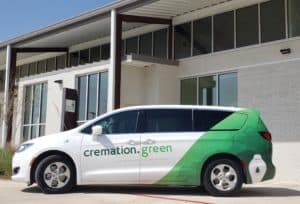Green Cremation Texas Shares Trends for the Future on the Deathcare Decoded Podcast
The owner of Green Cremation Texas, Eric Neuhaus, recently joined Justin Crowe and Alexandra Jo in a discussion on the Deathcare Decoded podcast. On Episode 19: The Future of Deathcare, the conversation focused on trends that are happening right now in the funeral industry that professionals need to prepare for moving forward.
Consumer vs Funeral Industry Driven Change
The last few years have disrupted every part of the funeral industry, which was already undergoing substantial changes. Some of the changes are driven by the industry itself, but primarily the change comes from consumers.
Consumer-Driven Change: More Options
It comes as no surprise that consumers want more funeral service options. Demand for personalized services has been a growing trend for the last five or so years. Traditional burial is no longer the clear choice for many families, and the slight majority now choose cremation over burial. As people become more comfortable discussing death, they are more likely to be open to different options that aren’t the norm.
Consumer-Driven Change: More Consumer Control Directing the Process
As with most purchases, funeral service customers are utilizing their resources and taking more control over their purchasing power. They’re more likely to compare funeral homes and make purchases through third-parties. They know their rights and are more inclined to negotiate prices. More families are going to step into the role of funeral director, and professionals need to be prepared for that.
Industry-Driven Change: Desire for Decentralization
Thought leaders understand that wants and needs are changing in the funeral industry. That has led to business models that are far from traditional. One of the newest concepts that’s gaining traction is decentralized brands for cremation that rely heavily on digital presence rather than physical presence.
The idea is that these types of companies can serve a broader range of people and make funeral services much more convenient and cheaper to plan since it’s all online. In that way they provide another option for consumers, and that’s a growing demand in the funeral industry. But Mr. Neuhaus wasn’t sold on the idea that it’s the next big shakeup for funeral homes.
Consumer-Driven Disrupter: Desire for Non-Virtual Contact
During the podcast an interesting statistic was shared. Decentralized, all-digital funeral homes are still called by the vast majority of customers before services are scheduled. This is despite the fact services can be arranged online.
This clearly suggests most families don’t want funeral services to be all-digital. The convenience factor does not override the customer’s desire to talk with a real person before making arrangements.
The Biggest Challenges Faced by the Funeral Industry Today
Leveraging technology while still maintaining a real physical presence in the community is a top priority at Green Cremation Texas. But it’s not an easy balancing act.
Gaining leads through a well-designed website is one thing, but it’s a long way off from having a decentralized business model that actually works. Customers want to actually see and meet the person that will handle a loved one’s funeral services. It’s a trust factor and a matter of reassurance getting to meet in-person and see the funeral home facilities that are in their community.
No matter how the industry evolves, one thing remains the same for funeral providers. In many instances, we’re taking part in something very personal and meaningful in our customers’ lives. Because of that consumers want to make a tangible connection with the provider.
Customers want a funeral home they can connect with offline, but those funeral homes will likely end up competing online with all-digital businesses. Families may end up contacting all-digital funeral homes only to find out they won’t be able to provide the experience the family wants.
At the end of the day, consumers aren’t ready for a digital disruption in the funeral industry like we’ve seen in other sectors such as finance and real estate. It’s an industry that thrives on one thing – providing services that the customer finds meaningful. That’s different for every customer, but almost all of them want a helping hand from a funeral home they can visit.
About the Deathcare Decoded Podcast
The Deathcare Decoded Podcast follows trends that are happening in the funeral industry as well as how we as a society approach end of life services. The podcast is created for professionals in the funeral industry to keep them up to speed with the latest innovations and ideas. It features funeral industry thought leaders who share their experiences and expertise.
The podcast is hosted by Justin Crowe, the founder and CEO of Parting Stone, a company that turns cremated remains into stones. Discussions are also co-hosted by Alexandra Jo, Parting Stone’s Cultural Manager.






